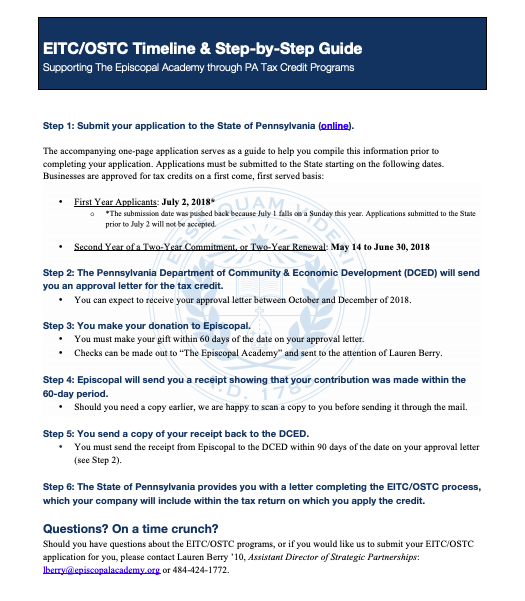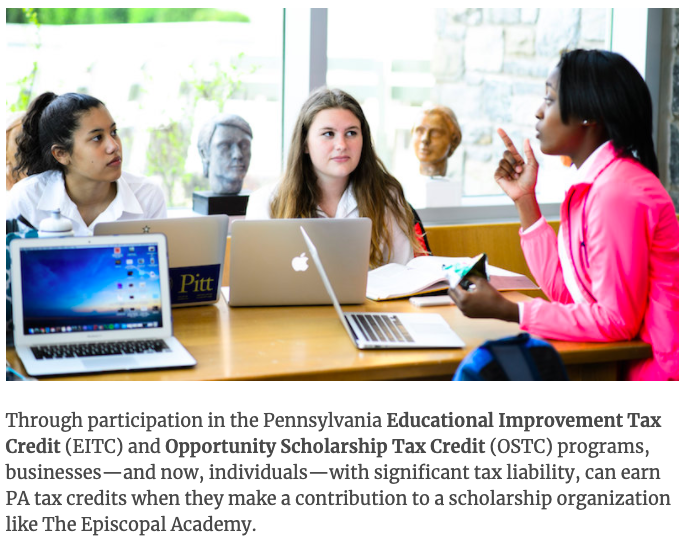Noble Brigham ‘20
The controversial EITC tax credit program is business as usual for Episcopal and other independent schools in Pennsylvania, but is generally murky to students, parents, and the average donor.
In theory, the Educational Improvement Tax Credit program allows corporations to donate to private school scholarship funds, thus lifting deserving children from failing public schools. In exchange for a two-year commitment, donors get to write off 90% of their donation from their state income tax payment. If used conscientiously, the reasoning is that it can help students and add valuable diversity to private schools.

However, some public school advocates are concerned that it is a grotesquely large advantage for wealthy private schools and argue that it indirectly takes state money from public schools because it is reducing the amount the state can re-distribute. The current cap is $110 million, which translates to several thousand scholarships.
T.J. Locke, Greville Haslam Head of School, is an enthusiastic supporter of EITC, as well as Opportunity Scholarship Tax Credit (OSTC), a similar program that provides financial assistance to low-income families. He notes, “By going through the EITC and OSTC programs you can make a much larger gift to EA by taking advantage of the tax credits. So the gift is a lot more than what your out-of-pocket expenses are. The logistics of it are that you make the gift long before you get the tax credit back so you have to be able to handle that kind of outlay of cash.”
Senior Form Dean Kris Aldridge’s in-laws started a scholarship fund about 20 years ago. She states that her family only has a vague awareness of the EITC program. She says, “[My father-in-law] always thought that making the Episcopal opportunity available to more than just families who could afford to pay the tuition was crucial to having a robust, interesting community.”
Locke agrees: “When I look at the list of students who are on some sort of tuition assistance, I can’t imagine the school without those kids.”
However, he admits that EITC allows 20% of the dollars raised to be used for general expenses and says, “I guess that’s a possibility [that EA would remove existing financial aid funds for other purposes].”
Alex Pearson, former Episcopal Head of Technology, has a unique perspective on EITC and school choice more broadly. His son helped to start a charter school in Baltimore, and in 2014, Pearson worked on obtaining an EITC grant for EA, but became disillusioned. “The money is counted as financial aid but then an equal amount of money gets taken out of financial aid and used for other purposes not related to financial aid,” he now says. “It’s like money laundering but legal.”
Pearson feels it is unfair and states that “It’s a huge advantage, because it’s only wealthy people who can take advantage of it and then they get a break from their Pennsylvania state taxes and then the money goes into the private schools they send their kids.”

Many students have no idea what the programs do. Will Hopkins ‘21 says, “I honestly don’t know what the EITC is.”
When EITC is explained to them, though, they are apprehensive. Grace Barton ‘21 states, “I think that this tax credit seems extremely similar to what some politicians are pushing for called ‘school choice’ (if it’s not the exact same thing). I think it sounds good in the short run but long term it could cause overcrowding in parochial and private schools and depleting resources in public schools.”
Ashley Lederman ‘21 says, “Public schools have always been a major part of the American education system and the government should focus their resources into those schools that need them.”
A WHYY-led investigation in 2019 revealed that private schools were using the EITC and Opportunity Scholarship Tax Credit (OSTC) programs liberally, but reporting few or no low income students. It found that Episcopal received $1.3 million in 2017-18 but that only about 2% of students were technically low income. By the time of the 2018-19 annual report, EA was reporting $3,896,913 in EITC/OSTC donations.
Locke notes that a broader definition of low income is needed because of the high cost of private school but says, “I don’t know where that number (2%) comes from.” In reality, it was released by EA.
Scholium attempted to interview Episcopal’s Business Manager, Larry Capuzzi, but he was unavailable for comment.
To Episcopal’s credit, according to available 990 tax returns, the school has increased financial aid as the EITC and OSTC programs have expanded. In 2015-16, $7,023,446 was awarded. In 2016-17, it had increased to $7,324,371. And in 2017-18, it was $7,418,132.
Locke says that these tax incentives have helped Episcopal to grow the financial aid program, but there is still progress to be made. He says, “I mean I’d love to say we’re totally need-blind, but the way we do our admissions it has the feeling of being need-blind… Well, ‘need-blind’s’ too strong.”